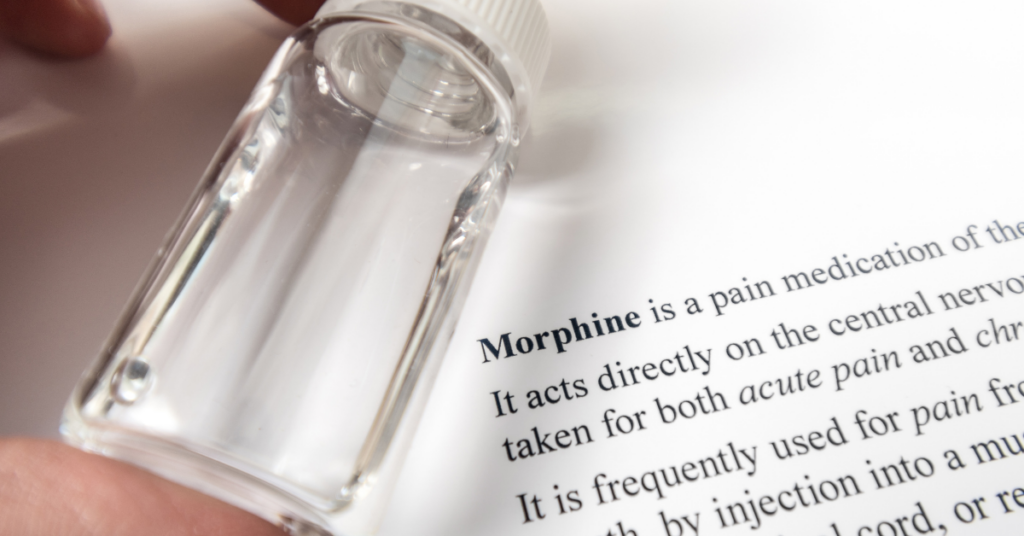Morphine is a pain reliever commonly used in the 18th century. It is an opiate that affects how the nervous system responds to pain. Usually, morphine is given to a person by injection or pill form. It is also known as a central nervous system depressant. The difference between opiates and opioids is that opiates are naturally found in the opium poppy plant, unlike opioids which are synthetic drugs. Over the years of use, studies have been conducted to determine the effects on human performance. This includes CNS arousal and the deviation of the visual axes of the eyes. Changes in cognitive abilities are also determined through these long-term studies. Read more about the history of morphine and how it first came to use on our history of morphine blog. The main medical uses for morphine include many scenarios and are usually given to a patient before and after surgery. Pain from a car accident or heart attack means morphine may be used, especially at the injury scene. If the head was injured, especially if it caused brain damage, then morphine can not be used since it may depress breathing. There are some unusual cases where morphine is medically used for severe cough or diarrhea. Broken bones or kidney stones are an everyday use of opiates.
What Are the Effects of Morphine on the Body
The effects of morphine on the body may surprise you as many aspects of the opiate set off different responses to individuals’ bodies. Besides dry mouth, dizziness, constricted pupils, or physical dependence, morphine may result in more severe outcomes. Firstly, the drug is known to become addictive. Although most people who are provided morphine for surgery or horrible injuries do not find a problem with stopping the use of the drug, many build a high tolerance which leads to a higher dose, causing addiction. Addiction means that a person becomes mentally, physically, and emotionally dependent on drugs despite the side effects. The misuse of morphine leads a person to feel intensely high or relaxed. The drug stays in the body for five days, but the effects wear off in a few hours, depending on the dosage.  Although cramps, muscle spasms, and hormone imbalance are side effects of the misuse of morphine, there are other long-term effects like gene expression and concerning impacts on the immune system. Gene expression refers to the alternation of the number of genes. Studies have shown that two groups of proteins are altered, which may be related to the overwhelming emotional instability caused by a high dose. Effects on the immune system regard the increased chances of infection in tuberculosis, HIV/AIDS, and pneumonia cases.
Although cramps, muscle spasms, and hormone imbalance are side effects of the misuse of morphine, there are other long-term effects like gene expression and concerning impacts on the immune system. Gene expression refers to the alternation of the number of genes. Studies have shown that two groups of proteins are altered, which may be related to the overwhelming emotional instability caused by a high dose. Effects on the immune system regard the increased chances of infection in tuberculosis, HIV/AIDS, and pneumonia cases.
Withdrawal Symptoms of Morphine
As soon as morphine ceases to flow in the bloodstream, withdrawal symptoms begin. Within 48 to 72 hours, a person withdrawing will likely experience high blood pressure and heart rate, insomnia, muscle and stomach pain, and even increased chances of falling into a mental state of depression. Factors that can influence severe withdrawal range from the amount and duration of drug use, any biological or genetic influences, if there is polydrug abuse, and also environmental pressure. If you feel like you are struggling with an addiction, it is vital to speak to your medical professional about what you are feeling to receive proper treatment.
Help for Morphine Withdrawal
Prescription morphine drug abuse has become an epidemic in the United States. It is not recommended to stop morphine intake “cold turkey” since it may induce intense symptoms. In some cases, slowing the decline of intake is usually more beneficial since it allows the body to process changes in the mind and body. Morphine addiction can seem scary due to the excessive cravings and, of course, the symptoms from withdrawal.Now that you know more about what the effects of morphine are on the body, if you or someone you know is going through this awareness, it is time to take action! Whether it’s medical detox or inpatient drug treatment that you need, our specialties at Evoke Wellness at Miramar are here to provide sincere care to your needs. Contact Evoke Wellness today at 833-819-6066 to learn how to get started. Further Reading: What Is Morphine Used For? (addictionblog.org)17 Effects of Morphine on the Body | Silver Pines (silverpinestreatmentcenter.com)


